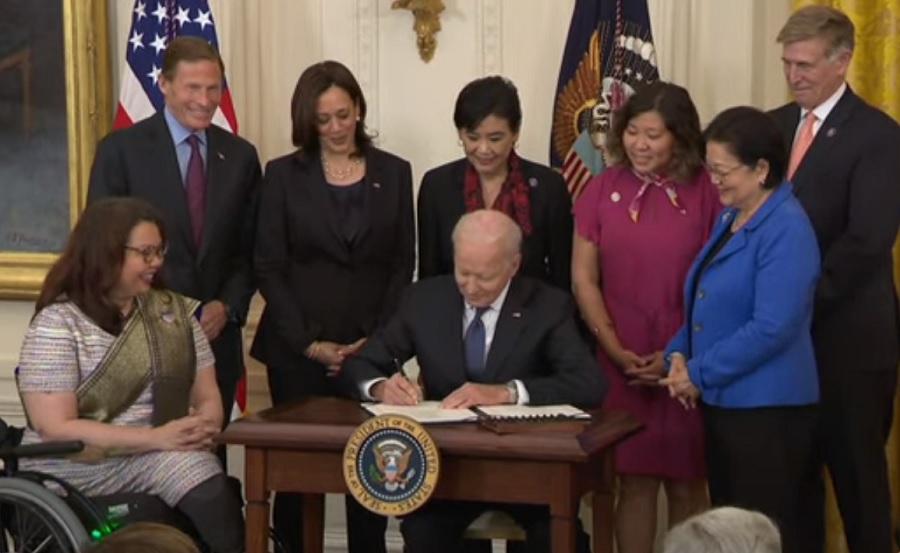
AAPI Victory Fund Chairman Shekar Narasimhan terms signing of the law as “a very important moment” for the country.
President Joe Biden signed into law a landmark anti-Asian American hate crime bill Thursday at a White House ceremony.
“Silence is complicity and we cannot be complicit. We have to speak out. We have to act,” the president told dozens of lawmakers and Asian American leaders gathered at the East Room. “That’s what you’ve done. And I can’t thank you enough. I’m proud today.”
The “COVID-19 Hate Crimes Act” follows a number of high-profile racially targeted attacks on members of the community. The bill, which passed the Senate by a vote of 94-1 in April and the House of Representatives by 364-62 earlier this month, marks a rare display of bipartisanship from Congress.
“We simply haven’t seen this kind of bipartisanship for much too long in America,” the president said.
Also present on stage to thank lawmakers was Vice President Kamala Harris, who told the gathering that the fight against discrimination is far from over.
“Racism exists in America,” she said. “Xenophobia exists in America. Anti-Semitism, Islamophobia, homophobia, transphobia, it all exists.”
Rep. Ami Bera (D-CA), Associate Attorney General Vanita Gupta, White House Senior Advisor Neera Tanden and AAPI Victory Fund Founder and Chairman Shekar Narasimhan,, were among the prominent Indian Americans present at the signing ceremony.
Talking to The American Bazaar by phone, Narasimhan described the signing of the legislation as “a very important moment” for the country “because for the first time we are going to document hate crime against Asian Americans.”
“Now we can monitor hate crime,” he said. “Until now, there has been significant under reporting, whether it is hate crime or domestic abuse.”
Narasimhan said the bill addresses the issue, by creating “a frame work under which federal, state and local authorities have to report hate crimes clearly.”
It also removes “certain nebulousness” out of the equation, he said, citing the example of a mass shooting at three Atlanta-area massage parlors March 16, 2021, in which eight people were killed, six of whom were Asian American women.
The 21-year-old suspect Robert Aaron Long blamed his sexual addiction, which he said was against his religious beliefs.
Narasimhan said under the new law suspects such as the one responsible for the Atlanta spa shooting can be tried for hate crime.
“Because [Long] frequented the [spa], he may have one motive and another motive,” the AAPI leader said. “It was not clear. This [legislation] clarifies. You may have three motives. If one of the motive can be attributed as hatred, or bigotry, that is enough. It helps with information and enforcement.”
Reports of violence and discrimination against Asian Americans have risen considerably since the start of the pandemic. According to the nonprofit Stop AAPI Hate, more than 6,600 anti-Asian hate incidents, which include instances of physical assault, verbal harassment, and civil rights violations, were recorded nationwide in the last year.



